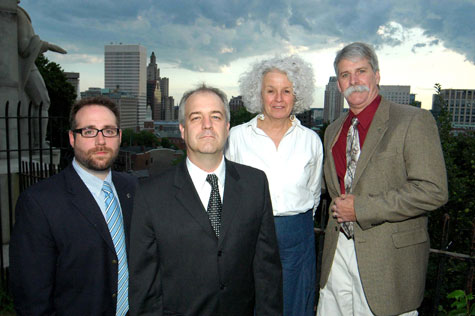
THE LEFT Sullivan, Handy, Ajello, and Guthrie. |
Rhode Island voters, for all their supposed insularity, are an increasingly progressive bunch.
Barack Obama won a landslide victory here. The most Catholic state in the union is overwhelmingly pro-choice. And a recent survey out of Brown University found fully 60 percent of voters in favor of same-sex marriage, with just 31 percent opposed.
Rhode Island is not merely a Democratic bastion. It is, by many measures, a liberal one.
And yet, the State House remains a curiously conservative place. Republicans have had a near monopoly on the governor's office for the last two decades. And the General Assembly, the most Democratic state legislature in the country, often seems as if it is doing its best GOP imitation.
Rhode Island remains the only state in New England that fails to recognize gay marriage. There is an odd obsession with illegal immigration on Smith Hill. Leading Democrats speak, with surprising fervor, about the importance of tax cuts for the Ocean State's wealthiest residents.
"You'd get laughed out of DC if you proposed that in Congress as a Democrat," said Matthew Jerzyk, a liberal lawyer and activist who has been haranguing the state legislature for years.
The General Assembly's conservative bent owes something to the power of incumbency: old-school pols, often resistant to generational shifts on prickly social concerns, have had little trouble winning re-election here. And in a legislature known for its centralized control, a relatively conservative Speaker of the House, William J. Murphy, has managed to keep a lid on ideological ferment.
But now, for the first time in memory, a progressive ascendancy is in view. And a State House long to the right of the electorate could, in a year-and-a-half, reflect something approaching the will of the people.
Governor Carcieri, a conservative Republican, is terming out of office and the leading contenders to replace him include two Democrats and an ex-Republican, Lincoln Chafee, who is arguably as liberal as his rivals.
Meanwhile, new Senate President M. Teresa Paiva Weed is shaping up as a friend to progressive legislators. And with Murphy widely expected to step down at the end of the 2009-2010 legislative session, despite his public pronouncements to the contrary, the House seems on the brink of change.
Majority Leader Gordon Fox, an openly gay Providence liberal, is the heir apparent for the speakership. And the Progressive Caucus, a loose assemblage of 12 to 20 lefty legislators centered in the House, seems positioned to move from agitator to insider.
But the left, for all its promise, is hardly assured of primacy.
The progressive wing of the legislature, if emergent, is still small. And it took a blow in the last couple of weeks, with the death of State Representataive Thomas C. Slater and State Representative Elizabeth M. Dennigan's announcement that she will challenge Congressman Jim Langevin in a Democratic primary next year.
Moreover, the imminent shift in Smith Hill leadership may not be the panacea it would appear. And the swirl of national events, so helpful to the local left in the last couple of years, could prove a problem in the not-so-distant future.
THE OBAMA FACTOR
President Bush was, in many respects, a godsend for Rhode Island Democrats.